To view past Formation Fridays
(Click on the Icon below)
***********************************
Formation Friday February 13, 2026
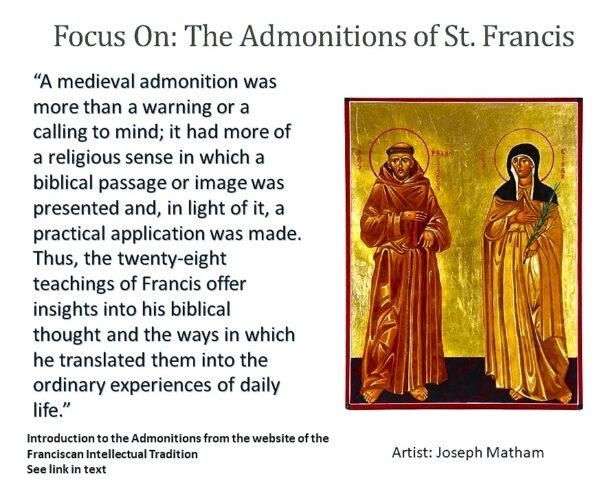
Please share with your fraternity
(en español abajo)
Focus on the Admonitions (#10)
[X. Castigating the Body]
1There are many people who, when they sin or are injured, frequently blame the enemy or their neighbor. Gn 3:12 Gn 3:13 2But it is not so, because each one has the enemy in his power, that is his body through which he sins.
3Blessed is the servant, Mt 24:46 then, who always holds captive the enemy delivered into his power and wisely safeguards himself from him; 4because, as long as he does this, no other enemy visible or invisible will be able to harm him.
From the Prologue to our Rule
“1All those men and women who are not living in penance, 2who do not receive the Body and Blood of our Lord Jesus Christ, 3who practice vice and sin and walk after the evil concupiscence and the evil desires of their flesh, 4who do not observe what they have promised to the Lord, 5and who in their body serve the world and the cares of this life: 6They are held captive by the devil, whose children they are, and whose works they do (Jn 8:41) 7They are blind because they do not see the true light, our Lord Jesus Christ.”
“11See you blind ones, deceived by your enemies: the flesh, the world and the devil, because it is sweet for the body to sin and it is bitter to serve God, 12for every vice and sin flow and proceed from the human heart (Mt 15:19, Mk 7:21) as the Lord says in the gospel. 13And you have nothing in this world or in that to come. 14And you think you will possess this world’s vanities for a long time, but you are deceived because a day and hour will come of which you give no thought, which you do not know, and of which you are unaware when the body becomes weak, death approaches, and it dies a bitter death.”
As you read Admonition X and the two paragraphs from the Prologue to our Rule (Concerning Those Who Do Not Do Penance), please consider the following questions. Record your thoughts in your journal or share them in a small group with other fraternity members.
+Blaming others has become the answer many in today’s society use when explaining why they have done something wrong. They say, “Yes, but…” Or “That’s how I was raised.” Or “No one told me/taught me.” Or “That’s just the way I am.”
—Explain the advice that St. Francis gives us on this topic in Admonition 10.
—How does he speak to us in the Prologue to our Rule to follow up on this advice?
—How often are we tempted to blame others for the wrongs we commit? Can you think of an example?
—Which Franciscan virtues can help us to avoid the temptation to blame others?
—What do I want to change about myself when it comes to blaming others?
Formación 13 de febrero, 2026

Enfoque en las admoniciones de San Francisco (Admoniciones X)
[Cap. X: Del castigo del cuerpo]
1Hay muchos que, cuando pecan o reciben una injuria, con frecuencia acusan al enemigo o al prójimo. 2Pero no es así, porque cada uno tiene en su poder al enemigo, es decir, al cuerpo, por medio del cual peca. 3Por eso, bienaventurado aquel siervo (Mt 24,46) que tiene siempre cautivo a tal enemigo entregado en su poder, y se guarda sabiamente de él; 4porque, mientras haga esto, ningún otro enemigo, visible o invisible, podrá dañarle.
Del Prólogo de nuestra regla
“Por el contrario, todos aquellos y aquellas que no viven en penitencia, ni reciben el cuerpo y la sangre de nuestro Señor Jesucristo, y viven en el vicio y el pecado, y van tras la mala concupiscencia (cf. Col 3,5) y los malos deseos de su carne (cf. Gál 5,16), y no cumplen lo que prometieron al Señor, y sirven corporalmente al mundo con los deseos carnales (1Pe 2,11) y con los afanes de este mundo (cf. Mt 13,22; Lc 21,34) y las preocupaciones de esta vida, engañados por el diablo, cuyos hijos son y cuyas obras hacen (cf. Jn 8,41), son unos ciegos (cf. Mt 15,14), pues no ven al que es la luz verdadera (cf. Jn 1,9), nuestro Señor Jesucristo.”
“Mirad, ciegos, engañados por vuestros enemigos, la carne, el mundo y el diablo, que al cuerpo le es dulce pecar y amargo servir a Dios; pues todos los vicios y pecados salen y proceden del corazón del hombre, como dice el Señor en el Evangelio (cf. Mc 7,21.23; Mt 15,18-19). Y nada tenéis en este mundo ni en el futuro. Pensáis poseer por mucho tiempo las vanidades de este mundo, pero estáis engañados, porque vendrán el día y la hora que no pensáis, que desconocéis e ignoráis (cf. Mt 24,44; 25,13): enferma el cuerpo, se acerca la muerte, y se muere así con muerte amarga (1Sam 15,32).”
Mientras lee la Admonición X y los dos párrafos del Prólogo de nuestra Regla (De los que no hacen penitencia), considere las siguientes preguntas. Escriba sus pensamientos en su diario o compártalos en un grupo pequeño con otros miembros de la fraternidad.
+Culpar a los demás se ha convertido en la respuesta que muchos en la sociedad actual utilizan para explicar por qué han hecho algo mal. Dicen: “Sí, pero…” o “Así me criaron.” O “Nadie me dijo/me enseñó.” O “Así soy yo.”
—Explique el consejo que nos da San Francisco sobre este tema en la Admonición 10.
—¿Cómo nos habla en el Prólogo de nuestra Regla para dar seguimiento a este consejo?
—¿Con qué frecuencia nos sentimos tentados a culpar a otros por los errores que cometemos? ¿Puede pensar en un ejemplo?
—¿Qué virtudes franciscanas pueden ayudarnos a evitar la tentación de culpar a los demás?
—¿Qué quiero cambiar de mí mismo cuando se trata de culpar a los demás?
***********************************
Formation Friday February 6, 2026
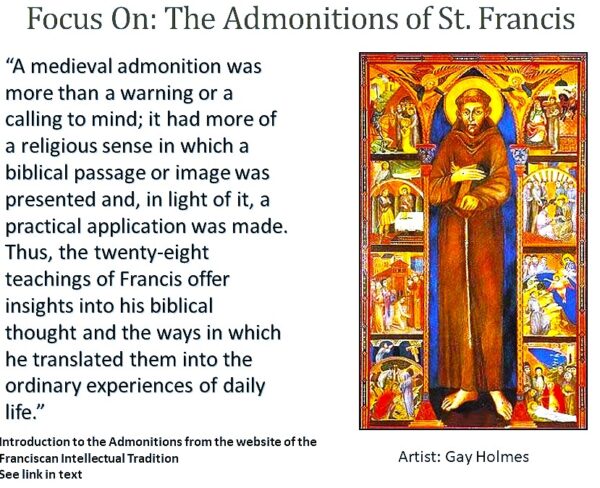
Please share with your fraternity
(en español abajo)
Focus on the Admonitions (VII and VIII)
[VII: Let Good Action Follow Knowledge]
1The apostle says: The letter kills, but the spirit gives life. 2 Cor 3:6
2Those people are put to death by the letter who only wish to know the words alone, that they might be esteemed wiser than others and be able to acquire great riches to give to their relatives and friends.
3And those religious are put to death by the letter who are not willing to follow the spirit of the divine letter but, instead, wish only to know the words and to interpret them for others.
4And those people are brought to life by the spirit of the divine letter who do not attribute every letter they know, or wish to know, to the body but, by word and example, return them to the most high Lord God to Whom every good belongs.
[VIII. Avoiding the Sin of Envy]
1The apostle says: No one can say: Jesus is Lord, except in the Holy Spirit; 1 Cor 12:3 2and: There is not one who does good, not even one. Rom 3:12
3Therefore, whoever envies his brother the good that the Lord says or does in him incurs a sin of blasphemy because he envies the Most High Himself Who says and does every good thing. Mt 20:15
Questions to discuss or to answer in your journal
+ Come, Holy Spirit! Open my mind and heart as I contemplate Admonition VII.
- How do we get sidetracked in our lives by the “letter of the law” (the literal words) as opposed to the spirit of the law (the intent of the law)?
- What are some ways that we can come to understand the spirit of what is asked of us in Scripture?
- Try to give an example of where “the letter” and “the spirit” affect us as Secular Franciscans.
+ Admonition VIII—Holy Spirit, help us to increase our humility as we consider Admonition VIII.
- First, take a look in the Catechism to see what it says about sinful envy. (2538-2540) (2553)
Catechism of the Catholic Church - When we see the gifts of others, what are some ways that we can avoid the sin of envy?
- Spend some time thinking about the gifts that the Holy Spirit has given you. How can you make the most of these gifts in your spiritual life? In your family life? In your life in fraternity?
Formación 6 de febrero, 2026

Enfoque en las Admoniciones VII y VIII
[Admonición VII: Que el buen obrar siga a la ciencia]
1Dice el Apóstol: La letra mata, pero el espíritu vivifica (2 Cor 3,6). 2Son matados por la letra aquellos que únicamente desean saber las palabras solas, para ser tenidos por más sabios entre los otros y poder adquirir grandes riquezas que dar a consanguíneos y amigos. 3Y son matados por la letra aquellos religiosos que no quieren seguir el espíritu de la divina letra, sino que desean más bien saber únicamente las palabras e interpretarlas para los otros. 4Y son vivificados por el espíritu de la divina letra aquellos que no atribuyen al cuerpo toda la letra que saben y desean saber, sino que, con la palabra y el ejemplo, la devuelven al altísimo Señor Dios, de quien es todo bien.
[Admonición VIII: Del pecado de envidia, que se ha de evitar]
1Dice el Apóstol: Nadie puede decir: Señor Jesús, sino en el Espíritu Santo (1 Cor 12,3); 2y: No hay quien haga el bien, no hay ni siquiera uno (Rom 3,12). 3Por consiguiente, todo el que envidia a su hermano por el bien que el Señor dice y hace en él, incurre en el pecado de blasfemia, porque envidia al mismo Altísimo (cf. Mt 20,15), que dice y hace todo bien.
Preguntas para platicar o responder en su diario
+ ¡Ven, Espíritu Santo! Abre mi mente y mi corazón mientras contemplo la Admonición VII.
- ¿Cómo nos desviamos en nuestras vidas por la “letra de la ley” (las palabras literales) en oposición al espíritu de la ley (la intención de la ley)?
- ¿Cuáles son algunas formas en que podemos llegar a comprender el espíritu de lo que se nos pide en las Escrituras?
- Trate de dar un ejemplo de dónde “la letra” y “el espíritu” nos afectan como franciscanos seglares.
+ Admonición VIII—Espíritu Santo, ayúdanos a aumentar nuestra humildad mientras consideramos la Admonición VIII.
- Primero, eche un vistazo al Catecismo para ver lo que dice acerca de la envidia pecaminosa. (2538-2540) (2553) Catecismo de la Iglesia Católica
- Cuando vemos los dones de los demás, ¿cuáles son algunas formas en que podemos evitar el pecado de la envidia?
- Dedique algún tiempo a pensar en los dones que el Espíritu Santo le ha dado. ¿Cómo puede aprovechar al máximo estos dones en tu vida espiritual? ¿En su vida familiar? ¿En su vida en fraternidad?
***********************************
Formation Friday January 30, 2026
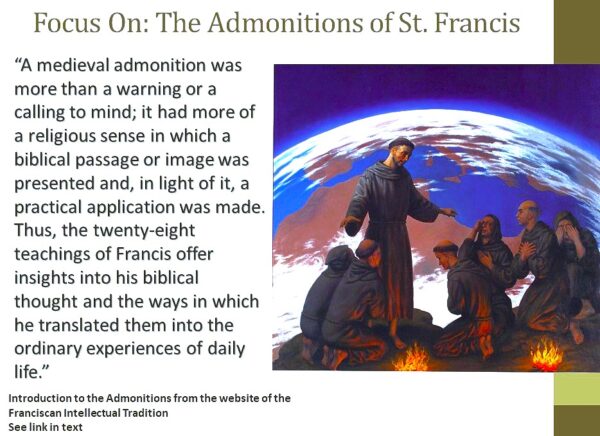
Please share with your fraternity
(en español abajo)
Focus on the Admonitions (V)
[V. Let No One Be Proud, but Boast in the Cross of the Lord]
1Consider, O human being, in what great excellence the Lord God has placed you, for He created and formed you to the image of His beloved Son according to the body and to His likeness according to the Spirit. Gn 1:27
2And all creatures under heaven serve, know, and obey their Creator, each according to its own nature, better than you. 3And even the demons did not crucify Him, but you, together with them, have crucified Him and are still crucifying Him by delighting in vices and sins.
4In what, then, can you boast? 5Even if you were so skillful and wise that you possessed all knowledge, 1 Cor 13:2 knew how to interpret every kind of language, 1 Cor 12:28 and to scrutinize heavenly matters with skill: you could not boast in these things. 6For, even though someone may have received from the Lord a special knowledge of the highest wisdom, one demon knew about heavenly matters and now knows more about those of earth than all human beings.a
7In the same way, even if you were more handsome and richer than everyone else, and even if you worked miracles so that you put demons to flight: all these things are contrary to you; nothing belongs to you; you can boast in none of these things.
8But we can boast in our weaknesses 2 Cor 12:5 and in carrying each day the holy cross of our Lord Jesus Christ. Lk 14:27
For discussion in fraternity, with a partner, or in your journal.
+What is challenging to you about this Admonition?
+Are you able to see your strengths and weaknesses?
+How do you view humility?
+Do you try to hide your strengths in an effort to be humble? +How can you avoid this?
Formación 30 de enero de 2026

Enfoque en las admoniciones de San Francisco (V)
[Cap. V: Que nadie se ensoberbezca, sino que se gloríe en la cruz del Señor]
1Considera, oh hombre, en cuán grande excelencia te ha puesto el Señor Dios, porque te creó y formó a imagen de su amado Hijo según el cuerpo, y a su semejanza (cf. Gén 1,26) según el espíritu.
2Y todas las criaturas que hay bajo el cielo, de por sí, sirven, conocen y obedecen a su Creador mejor que tú. 3Y aun los demonios no lo crucificaron, sino que tú, con ellos, lo crucificaste y todavía lo crucificas deleitándote en vicios y pecados.
4¿De qué, por consiguiente, puedes gloriarte? 5Pues, aunque fueras tan sutil y sabio que tuvieras toda la ciencia (cf. 1 Cor 13,2) y supieras interpretar todo género de lenguas (cf. 1 Cor 12,28) e investigar sutilmente las cosas celestiales, de ninguna de estas cosas puedes gloriarte; 6porque un solo demonio supo de las cosas celestiales y ahora sabe de las terrenas más que todos los hombres, aunque hubiera alguno que hubiese recibido del Señor un conocimiento especial de la suma sabiduría.
7De igual manera, aunque fueras más hermoso y más rico que todos, y aunque también hicieras maravillas, de modo que ahuyentaras a los demonios, todas estas cosas te son contrarias, y nada te pertenece, y no puedes en absoluto gloriarte en ellas;
8por el contrario, en esto podemos gloriarnos: en nuestras enfermedades (cf. 2 Cor 12,5) y en llevar a cuestas a diario la santa cruz de nuestro Señor Jesucristo (cf. Lc 14,27).
Para platicar en fraternidad, con un compañero o en su diario.
+¿Qué le resulta difícil de esta admonición?
+¿Es usted capaz de reconocer sus puntos fuertes y débiles?
+¿Cómo ve la humildad?
+¿Intenta ocultar sus puntos fuertes en un esfuerzo por ser humilde? +¿Cómo puede evitarlo?
***********************************
Formation Friday January 23, 2026
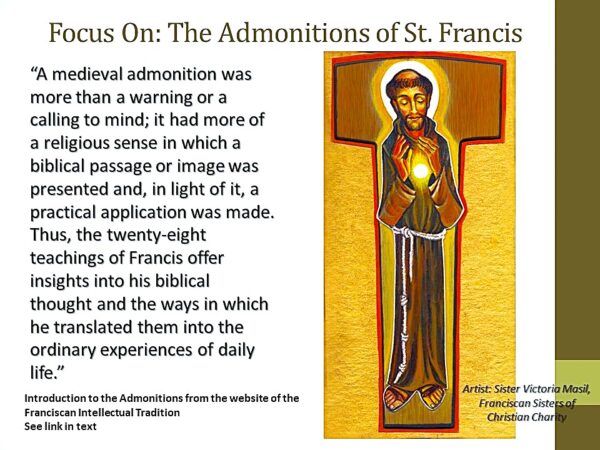
Please share with your fraternity
(en español abajo)
Focus on the Admonitions (IV, VI and IX)
[IV: Let No One Make Being Over Others His Own]
1I did not come to be served, but to serve, says the Lord. Mt 20:28
2Let those who are placed over others boast about that position as much as they would if they were assigned the duty of washing the feet of their brothers. 3And if they are more upset at having their place over others taken away from them than at losing their position at their feet, the more they store up a money bag Jn 12:6 to the peril of their soul.c
[VI: Imitation of Christ]
1Let all of us, brothers, consider the Good Shepherd Who bore the suffering of the cross to save His sheep.
2The Lord’s sheep followed Him in tribulation and persecution, in shame and hunger, in weakness and temptation, and in other ways; and for these things they received eternal life from the Lord.
3Therefore, it is a great shame for us, the servants of God, that the saints have accomplished great things and we want only to receive glory and honor by recounting them.
[IX: Love]
1The Lord says: Love your enemies [do good to those who hate you and pray for those who persecute and slander you]. Mt 5:44
2For that person truly loves his enemy who is not hurt by an injury done to him, 3but, because of love of God, is stung by the sin of his soul. 4Let him show him love by his deeds.
To discuss or answer in your journal:
+How does Admonition IV inspire me in my role as a servant leader in my fraternity?
+What does it say to me as a parent or as a leader in my community?
+How does Admonition VI encourage me to be strong in my following of Christ?
+How do I handle suffering for Christ?
+How do I explain my commitment to Christ to others?
+When you think about Admonition IX, what is your reaction?
+Are you able to live out this admonition?
Formación 23 de enero de 2026

Enfoque en las admoniciones de San Francisco (IV, VI y IX)
[Cap. IV: Que nadie se apropie la prelacía]
1No he venido a ser servido, sino a servir, dice el Señor (cf. Mt 20,28). 2Aquellos que han sido constituidos sobre los otros, gloríense de esa prelacía tanto, cuanto si hubiesen sido destinados al oficio de lavar los pies a los hermanos. 3Y cuanto más se turban por la pérdida de la prelacía que por la pérdida del oficio de lavar los pies, tanto más acumulan en la bolsa para peligro de su alma (cf. Jn 12,6).
[Cap. VI: De la imitación del Señor]
1Consideremos todos los hermanos al buen pastor, que por salvar a sus ovejas sufrió la pasión de la cruz. 2Las ovejas del Señor le siguieron en la tribulación y la persecución, en la vergüenza y el hambre, en la enfermedad y la tentación, y en las demás cosas; y por esto recibieron del Señor la vida sempiterna. 3De donde es una gran vergüenza para nosotros, siervos de Dios, que los santos hicieron las obras y nosotros, recitándolas, queremos recibir gloria y honor.
[Cap. IX: Del amor]
1Dice el Señor: Amad a vuestros enemigos, [haced el bien a los que os odian, y orad por los que os persiguen y calumnian] (Mt 5,44). 2En efecto, ama de verdad a su enemigo aquel que no se duele de la injuria que le hace, 3sino que, por amor de Dios, se consume por el pecado del alma de su enemigo. 4Y muéstrele su amor con obras.
Para platicar o contestar en su diario:
+¿Cómo me inspira la Admonición IV en mi papel de líder servidor en mi fraternidad?
+¿Qué me dice como padre o líder en mi comunidad?
+¿Cómo me anima la Admonición VI a ser fuerte en mi seguimiento de Cristo?
+¿Cómo manejo el sufrimiento por Cristo?
+¿Cómo explico mi compromiso con Cristo a los demás?
+Cuando piensa en la Admonición IX, ¿cuál es su reacción?
+¿Tiene usted éxito en vivir esta Admonición?
***********************************
Formation Friday January 16, 2026
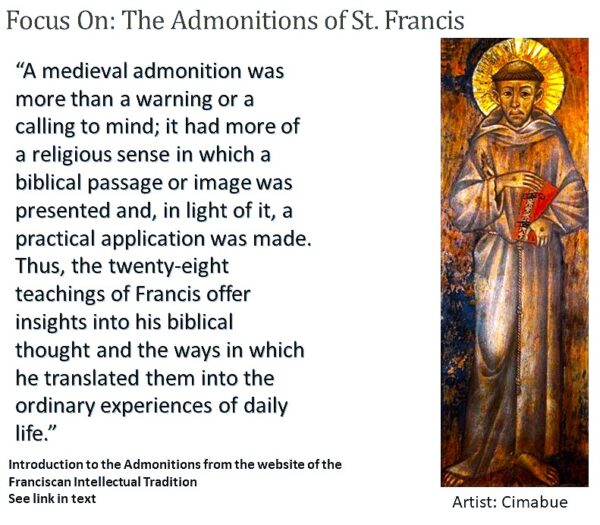
Please share with your fraternity
(en español abajo)
Focus on the Admonitions (#2 and #3)
[II. The Evil of Self-Will]b
1The Lord said to Adam: Eat of every tree; you may not eat, however, of the tree of the knowledge of good and evil. Gn 2:16 Gn 2:17
2He was able to eat of every tree of paradise, because he did not sin as long as he did not go against obedience. 3For that person eats of the tree of the knowledge of good who makes his will his own and, in this way, exalts himself over the good things the Lord says and does in him. 4And so, through the suggestion of the devil and the transgression of the command, it became the apple of the knowledge of evil. 5Therefore it is fitting that he suffer the punishment.
[III. Perfect Obedience]
1The Lord says in the Gospel: Whoever does not renounce all that he possesses cannot be my disciple; Lk 14:33 2and: Whoever wishes to save his life must lose it. Lk 9:24
3That person who offers himself totally to obedience in the hands of his prelate leaves all that he possesses and loses his body.a 4And whatever he does and says which he knows is not contrary to his will is true obedience, provided that what he does is good.
5And should a subject see that some things might be better and more useful for his soul than what a prelate commands, let him willingly offer such things to God as a sacrifice; and, instead, let him earnestly strive to fulfill the prelate’s wishes. 6For this is loving obedience because it pleases God and neighbor. 1 Pt 1:22
7If the prelate, however, commands something contrary to his conscience, even though he may not obey him, let him not, however, abandon him. 8And if he then suffers persecution from others, let him love them all the more for the sake of God. 1 Jn 3:15 1 Jn 3:16 9For whoever chooses to suffer persecution rather than wish to be separated from his brothers truly remains in perfect obedience because he lays down his life for his brothers. Jn 15:13 10In fact, there are many religious who, under the pretext of seeing things better than those which the prelate commands, look back, Lk 9:62 and return to the vomit Prv 26:11 of their own will. 11These people are murderers 2 Pt 2:22 and, because of their bad example, cause many to lose their souls
Questions to discuss or to comment on in your journal.
+ Come, Holy Spirit! Open my mind and heart as I contemplate Admonition II.
—As Secular Franciscans, we do not promise “obedience” as such. However, how does sacrificing our own will help us to live out our Rule?
—When do I have the most difficulty following the directives of my lawful superiors?
+ Come, Holy Spirit! Open my mind and heart as I contemplate Admonition III.
—How is obedience related to simplicity and humility?
—What are some ways that I can seek to have a well-informed conscience?
—How does having trust in the Lord help me to let go of my own will?
Formación: 16 de enero de 2026

(Comparta con su fraternidad local)
Enfoque en las admoniciones de San Francisco (Admoniciones II y III)
Cap. II: Del mal de la propia voluntad
1Dijo el Señor a Adán: Come de todo árbol, pero del árbol de la ciencia del bien y del mal no comas (cf. Gén 2,16.17). 2Podía comer de todo árbol del paraíso, porque, mientras no contravino a la obediencia, no pecó. 3Come, en efecto, del árbol de la ciencia del bien, aquel que se apropia su voluntad y se enaltece del bien que el Señor dice y obra en él; 4y así, por la sugestión del diablo y la transgresión del mandamiento, vino a ser la manzana de la ciencia del mal. 5De donde es necesario que sufra la pena.
Cap. III: De la perfecta obediencia
1Dice el Señor en el Evangelio: El que no renuncie a todo lo que posee, no puede ser discípulo mío (Lc 14,33); 2y: El que quiera salvar su vida, la perderá (Lc 9,24). 3Deja todo lo que posee y pierde su cuerpo el hombre que se ofrece a sí mismo todo entero a la obediencia en manos de su prelado. 4Y todo lo que hace y dice que él sepa que no es contra la voluntad del prelado, mientras sea bueno lo que hace, es verdadera obediencia. 5Y si alguna vez el súbdito ve cosas mejores y más útiles para su alma que aquellas que le ordena el prelado, sacrifique voluntariamente sus cosas a Dios, y aplíquese en cambio a cumplir con obras las cosas que son del prelado. 6Pues ésta es la obediencia caritativa (cf. 1 Pe 1,22), porque satisface a Dios y al prójimo.
7Pero si el prelado le ordena algo que sea contra su alma, aunque no le obedezca, sin embargo no lo abandone. 8Y si a causa de eso sufriera la persecución de algunos, ámelos más por Dios. 9Pues quien sufre la persecución antes que querer separarse de sus hermanos, verdaderamente permanece en la perfecta obediencia, porque da su vida (cf. Jn 15,13) por sus hermanos. 10Pues hay muchos religiosos que, so pretexto de que ven cosas mejores que las que les ordenan sus prelados, miran atrás (cf. Lc 9,62) y vuelven al vómito de la propia voluntad (cf. Prov 26,11; 2 Pe 2,22); 11éstos son homicidas y, a causa de sus malos ejemplos, hacen que se pierdan muchas almas.
Preguntas para platicar o responder en su diario
+ ¡Ven, Espíritu Santo! Abre mi mente y corazón mientras contemplo la Admonición II.
— Como franciscanos seglares, no prometemos “obediencia” como tal. Sin embargo, ¿cómo el sacrificio de nuestra propia voluntad nos ayudará a vivir nuestra Regla?
–¿Cuándo tengo más dificultades para seguir las directivas de mis superiores legales?
+ ¡Ven, Espíritu Santo! Abre mi mente y mi corazón mientras contemplo la Admonición III.
— ¿Cómo se relaciona la obediencia con la sencillez y la humildad?
–¿Cuáles son algunas de las formas en las que puedo buscar para tener una conciencia bien informada?
— ¿Cómo me ayuda el tener confianza en el Señor a dejar ir mi propia voluntad?
***********************************
Formation Friday January 9, 2026
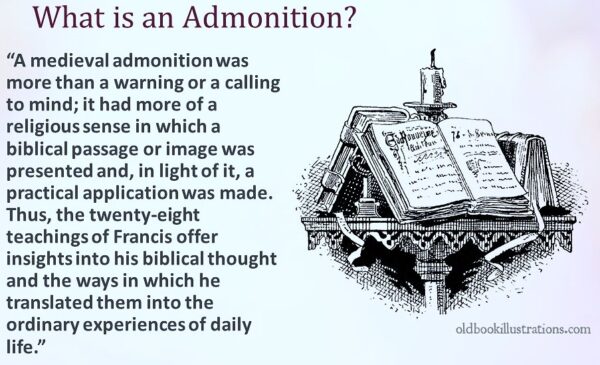
Please share with your fraternity
(en español abajo)
Focus on the Admonitions (#I)
[I. The Body of Christ]
1The Lord Jesus says to his disciples: I am the way, the truth and the life; no one comes to the Father except through me. 2If you knew me, you would also know my Father; and from now on, you do know him and have seen him. 3Philip says to him: Lord, show us the Father and it will be enough for us. 4Jesus says to him: Have I been with you for so long a time and you have not known me? Philip, whoever sees me sees my Father as well. Jn 14:6-9
5The Father dwells in inaccessible light, 1 Tm 6:16 and God is spirit, Jn 4:24 and no one has ever seen God. Jn 1:18 6Therefore He cannot be seen except in the Spirit because it is the Spirit that gives life; the flesh has nothing to offer. Jn 6:63 7But because He is equal to the Father, the Son is not seen by anyone other than the Father or other than the Holy Spirit.
8All those who saw the Lord Jesus according to the humanity, therefore, and did not see and believe according to the Spirit and the Divinity that He is the true Son of God were condemned. 9Now in the same way, all those who see the sacrament sanctified by the words of the Lord upon the altar at the hands of the priest in the form of bread and wine, and who do not see and believe according to the Spirit and the Divinity that it is truly the Body and Blood of our Lord Jesus Christ, are condemned.10[This] is affirmed by the Most High Himself Who says:
This is my Body and the Blood of my new covenant [which will be shed for many]; Mk 14:22 11and Whoever eats my flesh and drinks my blood has eternal life. Mk 14:24 12It is the Spirit of the Lord, Jn 6:55 therefore, That lives in Its faithful, That receives the Body and Blood of the Lord. 13All others who do not share in this same Spirit and presume to receive Him eat and drink judgment on themselves. 1 Cor 11:29
14Therefore: children, how long will you be hard of heart? Ps 4:3 15Why do you not know the truth and believe in the Son of God? Jn 9:35 16Behold, each day He humbles Himself as when He came from the royal throne Phil 2:8 into the Virgin’s womb; Wis 18:15 17each day He Himself comes to us, appearing humbly; 18each day He comes down from the bosom of the Father Jn 1:18 upon the altar in the hands of a priest.a
19As He revealed Himself to the holy apostles in true flesh, so He reveals Himself to us now in sacred bread. 20And as they saw only His flesh by an insight of their flesh, yet believed that He was God as they contemplated Him with their spiritual eyes, 21let us, as we see bread and wine with our bodily eyes, see and firmly believe that they are His most holy Body and Blood living and true. 22And in this way the Lord is always with His faithful, as He Himself says: Behold I am with you until the end of the age.
Questions to discuss or to answer in your journal
+ After reading this admonition carefully, note what Francis’s feelings are about the Eucharist.
+What do you believe about the Eucharist? What part does receiving the Eucharist play in your spiritual life?
Bishop Barron’s Sunday sermon on the Eucharist (2024)
Formación 9 de enero de 2026

(Comparta con su fraternidad local)
Enfoque en las admoniciones de San Francisco (Admonición I)
A D M O N I C I O N E S [Adm]
Cap. I: Del cuerpo del Señor
1Dice el Señor Jesús a sus discípulos: Yo soy el camino, la verdad y la vida; nadie va al Padre sino por mí. 2Si me conocierais a mí, ciertamente conoceríais también a mi Padre; y desde ahora lo conoceréis y lo habéis visto. 3Le dice Felipe: Señor, muéstranos al Padre y nos basta. 4Le dice Jesús: ¿Tanto tiempo hace que estoy con vosotros y no me habéis conocido? Felipe, el que me ve a mí, ve también a mi Padre (Jn 14,6-9).
5El Padre habita en una luz inaccesible (cf. 1 Tim 6,16), y Dios es espíritu (Jn 4,24), y a Dios nadie lo ha visto jamás (Jn 1,18). 6Por eso no puede ser visto sino en el espíritu, porque el espíritu es el que vivifica; la carne no aprovecha para nada (Jn 6,64). 7Pero ni el Hijo, en lo que es igual al Padre, es visto por nadie de otra manera que el Padre, de otra manera que el Espíritu Santo.
8De donde todos los que vieron al Señor Jesús según la humanidad, y no vieron y creyeron según el espíritu y la divinidad que él era el verdadero Hijo de Dios, se condenaron. 9Así también ahora, todos los que ven el sacramento, que se consagra por las palabras del Señor sobre el altar por mano del sacerdote en forma de pan y vino, y no ven y creen, según el espíritu y la divinidad, que sea verdaderamente el santísimo cuerpo y sangre de nuestro Señor Jesucristo, se condenan, 10como lo atestigua el mismo Altísimo, que dice: Esto es mi cuerpo y mi sangre del nuevo testamento, [que será derramada por muchos] (cf. Mc 14,22.24); 11y: Quien come mi carne y bebe mi sangre, tiene vida eterna (cf. Jn 6,55). 12De donde el espíritu del Señor, que habita en sus fieles, es el que recibe el santísimo cuerpo y sangre del Señor. 13Todos los otros que no participan del mismo espíritu y se atreven a recibirlo, comen y beben su condenación (cf. 1 Cor 11,29).
14De donde: Hijos de los hombres, ¿hasta cuándo seréis de pesado corazón? (Sal 4,3). 15¿Por qué no reconocéis la verdad y creéis en el Hijo de Dios? (cf. Jn 9,35). 16Ved que diariamente se humilla (cf. Fil 2,8), como cuando desde el trono real (Sab 18,15) vino al útero de la Virgen; 17diariamente viene a nosotros él mismo apareciendo humilde; 18diariamente desciende del seno del Padre (cf. Jn 1,18) sobre el altar en las manos del sacerdote.
19Y como se mostró a los santos apóstoles en carne verdadera, así también ahora se nos muestra a nosotros en el pan sagrado. 20Y como ellos, con la mirada de su carne, sólo veían la carne de él, pero, contemplándolo con ojos espirituales, creían que él era Dios, 21así también nosotros, viendo el pan y el vino con los ojos corporales, veamos y creamos firmemente que es su santísimo cuerpo y sangre vivo y verdadero. 22Y de este modo siempre está el Señor con sus fieles, como él mismo dice: Ved que yo estoy con vosotros hasta la consumación del siglo (cf. Mt 28,20).
Preguntas para discutir o responder en su diario
+ Después de leer esta Admonición con atención, apunte cuáles son los sentimientos de Francisco sobre la Eucaristía.
+ ¿Qué cree usted sobre la Eucaristía? ¿Qué papel juega el recibir la Eucaristía en su vida espiritual?
Un buen video (en inglés) del obispo Barron sobre la Eucaristía
***********************************
Formation Friday January 2, 2026
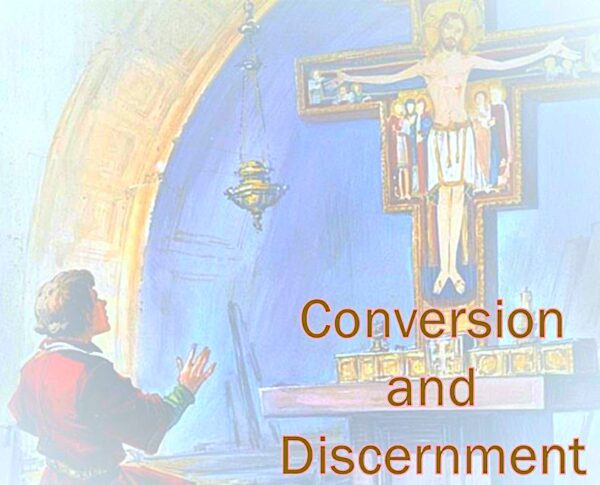
Please share with your fraternity
(en español abajo)
Conversion and Discernment
As we enter the new year, we focus on St. Francis’s conversion and how it can have a deep effect on our own conversion.
If you have read a good biography of St. Francis, it is easy to see different steps of a conversion process as they apply to different events in the life of Francis. During the time of discernment in the period of initial formation, or as professed members seek to strengthen their vocation, it is important to ponder the events of Francis’ conversion and vocation process and see how these might relate with your own conversion and vocation process.
As a help, you might use the following steps in a conversion process as they apply to the life of St. Francis, and then ask yourself how they might also apply in your own life:
- Darkness that can lead to openness (Questions and ambiguity can propel us to God) [Think about: Francis’ desire to be a knight; his restlessness; his time in prison; his illnesses and dreams]
- Listening and hearing (Prayer) [Think about: Francis’ encounter with the leper and how he began to think about the poor Christ; after traveling to Rome, he returns home and prays and waits for an answer] –the voice in the dream; the voice from the San Damiano Cross; the time in solitude listening to the Lord
- Choosing to follow [Think about: Francis realizes that his true bride is Lady Poverty; He hears the voice from the San Damiano cross and responds immediately; Hears the voice in his dream-“Who do you want to follow, the servant or the master?” St. Clare and Bro. Sylvester counsel Francis to preach instead of becoming a hermit]
- Signs which strengthen our decisions and our walk [Kissing the leper; trading clothes with the beggar in Rome; He hears the voice from the San Damiano crucifix]
- Finding new direction [All of the above begin to move him in a new direction. He begins the “rebuilding” process.]
- Life of Christ/Gospel as point of contact and reference
- Finding support in this newness
- Walking in faith [“The Lord gave me brothers…]
- Trusting even in darkness
- Darkness that can lead to openness
- As conversion is ongoing, we “begin again”, returning to the top
From For Up to Now: Franciscan Movement Part 1 “The Journey of Francis” by Jan Parker, OFS
As you think about each of the above points,
+Think about your own life and the timeline that has brought you to where you are today.
+Has the discernment of your vocation taken a smooth path?
+How has the Holy Spirit helped you to overcome the bumps along the way?
+What still requires work and prayer in your life?
Comment in your journal or share with your fraternity or formation group.
Looking for a biography of St. Francis? Here are a few suggestions:
—St. Francis of Assisi: Passion, Poverty, and the Man who Transformed the Catholic Church. By Bret Thoman OFS (entry level)
— St. Francis of Assisi: A Biography by Omer Englebert
— Francis: The Journey and the Dream by Murray Bodo O.F.M. and John Michael Talbot (entry level)
–-Francis of Assisi: The Life and Afterlife of a Medieval Saint by André Vauchez
_________________________________________________________
Formación 2 de enero 2026]

(Comparta con su fraternidad local)
Conversión y discernimiento
Al entrar en el año nuevo, nos enfocamos en la conversión de San Francisco y cómo puede tener un efecto profundo en nuestra propia conversión.
Si ha leído una buena biografía de San Francisco, es fácil ver los diferentes pasos de un proceso de conversión que se aplican a diferentes eventos en la vida de Francisco. Durante el tiempo de discernimiento en el período de formación inicial, o cuando los miembros profesos buscan fortalecer su vocación, es importante reflexionar sobre los eventos del proceso de conversión y vocación de Francisco, y ver cómo estos pueden relacionarse con su propio proceso de conversión y vocación.
Como ayuda, puede utilizar los siguientes pasos en un proceso de conversión según se apliquen a la vida de San Francisco, y luego preguntarse cómo podrían aplicarse también en su propia vida:
- Oscuridad que puede conducir a la apertura(las preguntas y la ambigüedad pueden impulsarnos a Dios) [Piense en: el deseo de Francisco de ser caballero; su inquietud; su tiempo en prisión; sus enfermedades y sueños]
- Escuchar y oír (oración)[Piense en: el encuentro de Francisco con el leproso y cómo empezó a pensar en el Cristo pobre; después de viajar a Roma, regresa a casa y reza y espera una respuesta] –la voz en el sueño; la voz de la Cruz de San Damián; el tiempo en soledad escuchando al señor
- Elegir seguir[Piense en: Francisco se da cuenta de que su verdadera esposa es Lady Poverty; Oye la voz desde la cruz de San Damiano y responde de inmediato; Oye la voz en su sueño: “¿A quién quieres seguir, al sirviente o al amo?” St. Clare y Bro. Sylvester aconseja a Francisco que predique en lugar de convertirse en ermitaño]
- Señales que fortalecen nuestras decisiones y nuestro caminar[Besar al leproso; intercambiar ropa con el mendigo en Roma; Oye la voz del crucifijo de San Damián]
- Encontrar una nueva dirección[Todo lo anterior comienza a moverlo en una nueva dirección. Comienza el proceso de “reconstrucción”.]
- Vida de Cristo / Evangeliocomo punto de contacto y referencia
- Encontrar apoyo en esta novedad
- Caminando en fe[“El Señor me dio hermanos…]
- Confiar incluso en la oscuridad
- Oscuridad que puede conducir a la apertura.
- A medida que la conversión está en curso,“comenzamos de nuevo”, volviendo a la parte superior
FOR UP TO NOW (FUN): Movimiento franciscano Parte 1 “El viaje de Francisco” por Jan Parker, OFS
Mientras reflexiona sobre cada uno de los puntos anteriores:
+Piense en su propia vida y en la trayectoria que le ha llevado hasta donde está usted hoy.
+¿Ha sido fácil discernir su vocación?
+¿Cómo le ha ayudado el Espíritu Santo a superar los obstáculos que se le han presentado?
+¿Qué aspectos de su vida aún requieren trabajo y oración?
Comente en su diario o comparta con su fraternidad o grupo de formación.
¿Busca una biografía de San Francisco? Aqui hay dos sugerencias:
Biografia de San Francisco de Asis: Francisci Assisensis vita et miracula (Spanish Edition) by Tomás de Celano
San Francisco de Asís (Spanish Edition) by G. K. Chesterton
***********************************
Formation Friday December 26, 2025
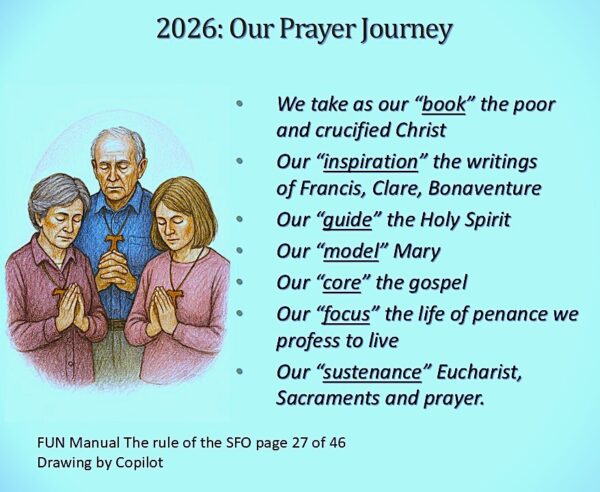
Please share with your fraternity
(en español abajo)
Taking Stock in 2026 Our Lives of Prayer as Secular Franciscans
“As Minister General of a large Order, St. Bonaventure provided, among other things, spiritual direction for those seeking God. In a letter to Poor Clare nuns, he offered directives as to how we might enter into prayer by way of ‘descent.’
“The steps are summarized as follows:
- Return to yourself; Enter into your heart;
- Ponder what you were, are, should have been, called to be;
- What you are by nature;
- What you are through sin;
- What you should have been through effort;
- What you can still be through grace;
- Meditate in your heart;
- Let your spirit brood. (Are you resentful, angry, jealous?);
- Plow this field, work on yourself;
- Strive for freedom within, the freedom that leads to relationship with God, realizing that God will never force us to love him;
- Lack of self-knowledge and failure to appreciate one’s own worth make for faulty judgment in all other matters;
- If you are not able to understand (and accept) your own self, you will not be able to understand (or accept) what is beyond you.”
Bonaventure, Perfectione vitae ad sorores (Perf. Vit.) 1.5 (VIII, 109). Engl. trans. Jose de Vinck, “On the Perfection of Life, Addressed to Sisters,” in The Works of Bonaventure, vol. 1, Mystical Opscula (Paterson, N.J.: Saint Anthony Guild Press, 1960), 214.
Quoted in: Delio, Ilia. Franciscan Prayer (Kindle Locations 613-616). Kindle Edition.
For our Prayer Journey as Secular Franciscans
- We take as our “book” the poor and crucified Christ
- Our “inspiration” the writings of Francis, Clare, Bonaventure
- Our “guide” the Holy Spirit
- Our “model” Mary
- Our “core” the gospel
- Our “focus” the life of penance we profess to live
- Our “sustenance” the Eucharist, Sacraments and prayer.
FUN Manual The rule of the SFO page 27 of 46
Questions for discussion or to comment on in your journal
+How has your prayer life changed over the years?
+If you are a Secular Franciscan, how does your prayer reflect who you are as member (or candidate) of the Order?
+Does prayer influence how you live your life?
+Based on St. Bonaventure’s directives above, how can you strengthen your prayer life?
_________________________________________________________
Formación 26 diciembre de 2025

(compartir con su fraternidad)
2026 Momento de examinar nuestras vidas de oración como franciscanos seglares
“Como Ministro General de una Orden grande, San Buenaventura proporcionó, entre otras cosas, dirección espiritual para quienes buscaban a Dios. En una carta a las monjas Clarisas, ofreció directivas sobre cómo podríamos entrar en oración a través de la ‘descendencia.’ “
“Los pasos se resumen a continuación:
- Regrese a usted mismo; Entre en su corazón;
- Reflexione sobre lo que usted fue, es, debería haber sido llamado a ser;
- Lo que usted es por naturaleza;
- Qué es usted por el pecado;
- Lo que debería haber sido a través del esfuerzo;
- Lo que aún puede ser gracias a la gracia;
- Medite en su corazón;
- Deje que su espíritu se dé vueltas. (¿Está resentido, enojado, celoso?);
- Are este campo, trabaje en si mismo;
- Luche por la libertad interior, la libertad que conduce a la relación con Dios, reconociendo que Dios nunca nos obligará a amarlo;
- La falta de autoconocimiento y la incapacidad de apreciar el valor propio dan lugar a un juicio erróneo en todos los demás asuntos;
- Si no puede entenderse (y aceptarse) a sí mismo, no podrá comprender (o aceptar) lo que está más allá de usted.”
Buenaventura, Perfectione vitae ad sorores (Perf. Vit.) 1.5 (VIII, 109). Engl. trans. José de Vinck, “Sobre la perfección de la vida, dirigida a las hermanas”, en Las obras de Buenaventura, vol. 1, Mystical Opscula (Paterson, Nueva Jersey: Saint Anthony Guild Press, 1960), 214.
Citado en: Delio, Ilia. Oración franciscana (ubicaciones de Kindle 613-616). Versión Kindle.
Por nuestro viaje de oración como franciscanos seglares
- Tomamos como nuestro “libro” al Cristo pobre y crucificado
- Nuestra “inspiración” los escritos de Francisco, Clara, Buenaventura
- Nuestro “guía” el Espíritu Santo
- Nuestra “modelo” María
- Nuestro “núcleo” el evangelio
- Nuestro “enfoque” la vida de penitencia que profesamos vivir
- Nuestro “sustento” la Eucaristía, los Sacramentos y la oración.
FUN Manual La regla de la OFS página 27 de 46
Preguntas para platicar o comentar en su diario
+ ¿Cómo ha cambiado su vida de oración a lo largo de los años?
+ Si es un franciscano seglar, ¿cómo refleja su oración quién es como miembro (o candidato) de la Orden?
+ ¿Influye la oración en cómo vive su vida?
+ Según las directivas de San Buenaventura ya mencionadas, ¿cómo puede fortalecer su vida de oración?
***********************************
Formation Friday December 19, 2025
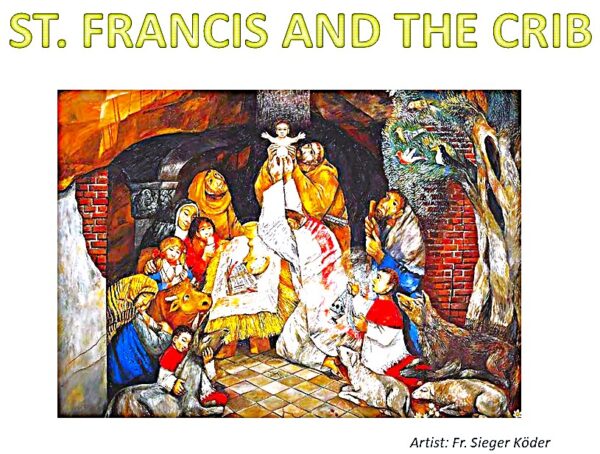
Please share with your fraternity
(en español abajo)
St. Francis and the Crib
St. Francis centered his life and spirituality on the Incarnation, the humanity of Christ. He was in awe that God “bent down” to be with us through his birth; through his suffering and death on the cross; and through the Eucharist by which he remains with us for all time. As we approach Christmas, we reflect on St. Francis and the Crib.
++ “3We thank You for as through Your Son You created us, so through Your holy love with which You loved us Jn 17:26
You brought about His birth as true God and true man by the glorious, ever-virgin, most blessed, holy Mary and You willed to redeem us captives through His cross and blood and death.” FA:ED, vol. 1, 82 The Earlier Rule
++ “Francis used to recall with regular meditation the words of Christ and recollect His deeds with most attentive perception. Indeed, so thoroughly did the humility of the Incarnation and the charity of the Passion occupy his memory that he scarcely wanted to think of anything else. FA:ED, vol. 1, 254 The Life of Saint Francis by Thomas of Celano
++“As usual, blessed Francis had John summoned to him some fifteen days prior to the birthday of the Lord. ‘If you desire to celebrate the coming feast of the Lord together at Greccio,’ he said to him, ‘hurry before me and carefully make ready Prv 24:27 the things I tell you. For I wish to enact the memory of that babe who was born in Bethlehem: to see as much as is possible with my own bodily eyes the discomfort of his infant needs, how he lay in a manger, Lk 2:7 and how, with an ox and an ass standing by, he rested on hay.’” FA:ED, vol. 1, 255 The Life of Saint Francis by Thomas of Celano
++ “Moreover, burning with excessive love, he often calls Christ the ‘babe from Bethlehem’ whenever he [Francis] means to call Him Jesus. Saying the word ‘Bethlehem’ in the manner of a bleating sheep, he fills his whole mouth with sound but even more with sweet affection. He seems to lick his lips whenever he uses the expressions ‘Jesus’ or ‘babe from Bethlehem,’ tasting the word on his happy palate and savoring the sweetness of the word.” FA:ED, vol. 1, 256 The Life of Saint Francis by Thomas of Celano
++ “Humility enabled Francis to celebrate the birth of the Incarnate Word that he heard, preached, and lived throughout his life.” The Life of Saint Francis by Thomas of Celano FA:ED, vol. 1, p. 177
Each of the above quotes can be found on the Franciscan Tradition website: (You will need to sign in, but the resources are worth it!
Francis of Assisi: Early Documents, Vol. 1, The Saint
Questions to discuss or to answer in your journal
+Why do you think St. Francis was so in awe of the Incarnation of Christ?
+Give some examples of how St. Francis imitated Jesus.
+How do we see the Incarnate Lord? In His birth and in His passion and death?
____________________________________________________________
Formación 19 diciembre de 2025

(compartir con su fraternidad)
San Francisco y el Pesebre
San Francisco centró su vida y espiritualidad en la Encarnación, la humanidad de Cristo. Estaba asombrado de que Dios “se inclinara” para estar con nosotros durante su nacimiento; por su sufrimiento y muerte en la cruz; y através de la Eucaristía por la que permanece con nosotros para siempre. Ahora que se acerca la Navidad, reflejamos sobre San Francisco y el Pesebre.
++ “3Y te damos gracias porque, así como por tu Hijo nos creaste, así, por tu santo amor con el que nos amaste (cf. Jn 17,26), hiciste que él, verdadero Dios y verdadero hombre, naciera de la gloriosa siempre Virgen la beatísima santa María, y quisiste que nosotros, cautivos, fuéramos redimidos por su cruz y sangre y muerte.” Regla no bulada Capítulo XXIII
++ “En asidua meditación recordaba sus palabras y con agudísima consideración repasaba sus obras. Tenía tan presente en su memoria la humildad de la encarnación y la caridad de la pasión, que difícilmente quería pensar en otra cosa.
1 Celano Capítulo XXX (84)
++ “ Francisco le llamó (a Juan), como solía hacerlo con frecuencia, y le dijo: «Si quieres que celebremos en Greccio esta fiesta del Señor, date prisa en ir allá y prepara prontamente lo que te voy a indicar. Deseo celebrar la memoria del niño que nació en Belén y quiero contemplar de alguna manera con mis ojos (28) lo que sufrió en su invalidez de niño, cómo fue reclinado en el pesebre y cómo fue colocado sobre heno entre el buey y el asno»” 1 Celano Capítulo XXX (84)
++ “Muchas veces, al querer mencionar a Cristo Jesús, encendido en amor, le dice «el Niño de Bethleem», y, pronunciando «Bethleem» como oveja que bala, su boca se llena de voz; más aún, de tierna afección. Cuando le llamaba «niño de Bethleem» o «Jesús», se pasaba la lengua por los labios como si gustara y saboreara en su paladar la dulzura de estas palabras.” 1 Celano Capítulo XXX (86)
Todos los enlaces se encuentran aquí: https://franciscanos.org/esfa/menud2.html
Preguntas para platicar o responder en su diario
+ ¿Por qué crees que San Francisco estaba tan asombrado por la Encarnación de Cristo?
+ ¿Dar algunos ejemplos de cómo San Francisco imitó a Jesús.
+ ¿Cómo vemos al Señor Encarnado? ¿En su nacimiento y en su pasión y muerte?
***********************************
Formation Friday December 12, 2025
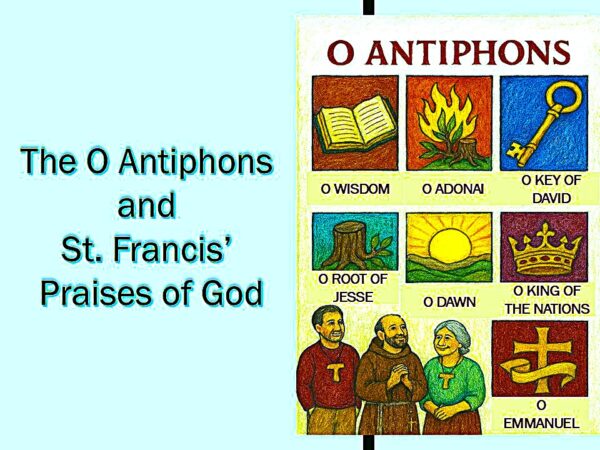
Please share with your fraternity
(en español abajo)
St. Francis’s Praises of God and the O Antiphons
If you have ever read St. Francis’s Praises of God, you may have noticed that they mirror the O Antiphons which we pray starting December 17th each year. You will notice these Antiphons appear each day for the Canticle of Mary from December 17th to the 23rd.
The Praises of God
You are the holy Lord God Who does wonderful things.
You are strong. You are great. You are the most high.
You are the almighty king. You holy Father,
King of heaven and earth.
You are three and one, the Lord God of gods;
You are the good, all good, the highest good,
Lord God living and true.
You are love, charity; You are wisdom, You are humility,
You are patience, You are beauty, You are meekness,
You are security, You are rest,
You are gladness and joy, You are our hope, You are justice,
You are moderation, You are all our riches to sufficiency.
You are beauty, You are meekness,
You are the protector, You are our custodian and defender,
You are strength, You are refreshment. 6You are our hope,
You are our faith, You are our charity,
You are all our sweetness, You are our eternal life:
Great and wonderful Lord, Almighty God, Merciful Savior.
Each day, meditate on the relationship between the antiphons and Francis’s writings.
December 17: O Sapientia (O Wisdom)
PRAISES OF GOD: “You are love, charity; You are wisdom,
You are patience, You are beauty, You are meekness,…”
December 18: O Adonai (O Lord)
PRAISES OF GOD: “You are the holy Lord God Who does wonderful things.
You are strong. You are great. You are the most high.
You are three and one, the Lord God of gods;
You are the good, all good, the highest good,
Lord God living and true…”
December 19: O Radix Jesse (O Root of Jesse)
PRAISES OF GOD: “You are security, You are rest,
You are gladness and joy, You are our hope, You are justice,
You are moderation, You are all our riches to sufficiency.”
December 20: O Clavis David (O Key of David)
PRAISES OF GOD: “You are the protector, You are our custodian and defender,
You are strength…”
December 21: O Oriens (O Dayspring)
PRAISES OF GOD: “You are beauty, You are meekness,
You are refreshment. 6You are our hope,
You are our faith, You are our charity,…”
December 22: O Rex Gentium (O King of the Nations)
PRAISES OF GOD: “You are the almighty king. You holy Father,
King of heaven and earth.”
December 23: O Emmanuel (God is with us.)
PRAISES OF GOD: “You are all our sweetness, You are our eternal life:
Great and wonderful Lord, Almighty God, Merciful Savior.”
As Advent draws to a close, use the Praises of God above to enhance your meditations on the coming of our Lord Jesus,
____________________________________________________________
Formación 12 de diciembre, 2025
(Compartir con su fraternidad local)
Las Alabanzas del Dios Aaltísimo de San Francisco y las Antífonas O
Si alguna vez ha leído las Alabanzas a Dios de San Francisco, habrá notado que reflejan las Antífonas O que rezamos a partir del 17 de diciembre de cada año. Verá que estas Antífonas aparecen cada día en las Vísperas en el Cántico de María, del 17 al 23 de diciembre.
Las alabanzas del Dios altísimo
Tú eres santo, Señor Dios único, que haces maravillas.
Tú eres fuerte, tú eres grande, tú eres altísimo, tú eres rey omnipotente, tú, Padre santo, rey del cielo y de la tierra.
Tú eres trino y uno, Señor Dios de dioses, tú eres el bien, todo el bien, el sumo bien, Señor Dios vivo y verdadero.
Tú eres amor, caridad; tú eres sabiduría, tú eres humildad, tú eres paciencia, tú eres belleza, tú eres mansedumbre, tú eres seguridad, tú eres quietud, tú eres gozo, tú eres nuestra esperanza y alegría, tú eres justicia, tú eres templanza, tú eres toda nuestra riqueza a satisfacción.
Tú eres belleza, tú eres mansedumbre; tú eres protector, tú eres custodio y defensor nuestro; tú eres fortaleza, tú eres refrigerio.
Tú eres esperanza nuestra, tú eres fe nuestra, tú eres caridad nuestra, tú eres toda dulzura nuestra, tú eres vida eterna nuestra: Grande y admirable Señor, Dios omnipotente, misericordioso Salvador. DIRECTORIO FRANCISCANO
Cada día, medite sobre la relación entre las antífonas y los escritos de Francisco.
17 diciembre: O Sapientia (O Sabiduría)
ALABANZAS DE DIOS: “Tú eres amor, caridad; tú eres sabiduría,
tú eres paciencia, tú eres belleza, tú eres mansedumbre,”
18 diciembre: O Adonai
ALABANZAS DE DIOS: “Tú eres santo, Señor Dios único, que haces maravillas.
Tú eres fuerte, tú eres grande, tú eres altísimo,.
Tú eres trino y uno, Señor Dios de dioses,
tú eres el bien, todo el bien, el sumo bien,
Señor Dios vivo y verdadero.”
19 diciembre: O Radix Jesse (O Raíz de Jesé)
ALABANZAS DE DIOS: “tú eres seguridad, tú eres quietud,
tú eres gozo, tú eres nuestra esperanza y alegría, tú eres justicia,
tú eres templanza, tú eres toda nuestra riqueza a satisfacción.”
20 de diciembre: O Clavis David (O Llave de David)
ALABANZAS DE DIOS: “tú eres protector, tú eres custodio y defensor nuestro;
tú eres fortaleza,”
21 de diciembre: O Oriens (O Amancecer)
ALABANZAS DE DIOS: tú eres belleza, tú eres mansedumbre,
Tú eres refrigerio..
Tú eres esperanza nuestra, tú eres fe nuestra, tú eres caridad nuestra,
22 de diciembre: O Rex Gentium (O Rey de las naciones)
ALABANZAS DE DIOS: “Tú eres rey omnipotente, tú, Padre santo,
rey del cielo y de la tierra.”
23 de diciembre: O Emmanuel (Dios está con nosotros)
ALABANZAS DE DIOS: “Tú eres toda dulzura nuestra, tú eres vida eterna nuestra:
Grande y admirable Señor, Dios omnipotente, misericordioso Salvador.”
A medida que el Adviento llega a su fin, utilice las alabanzas a Dios anteriores para mejorar sus meditaciones sobre la venida de nuestro Señor Jesucristo.
***********************************
Formation Friday December 5, 2025
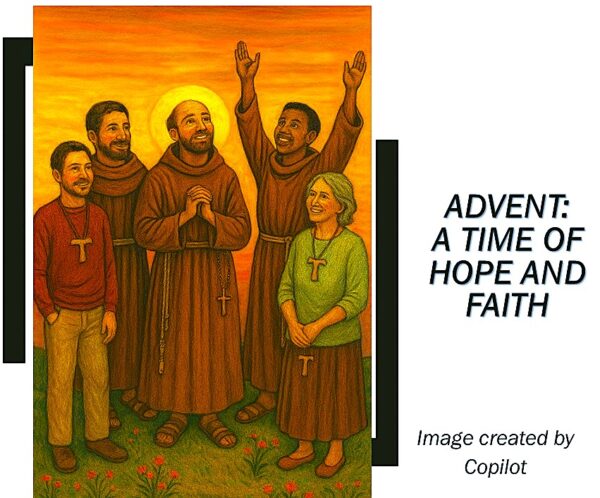
Please share with your fraternity
(en español abajo)
Advent a time of Hope and Faith
Secular Franciscans are people of conversion. Looking through this lens during Advent, we realize that seeking conversion requires hope and faith.
CONSIDER:
+ Our Rule: Article 19—”Mindful that they are bearers of peace which must be built up unceasingly, they should seek out ways of unity and fraternal harmony through dialogue, trusting in the presence of the divine seed in everyone and in the transforming power of love and pardon. Messengers of perfect joy in every circumstance, they should strive to bring joy and hope to others.”
+ Our Rule: Article 9—”The Virgin Mary, humble servant of the Lord, was open to his every word and call. She was embraced by Francis with indescribable love and declared the protectress and advocate of his family15. The Secular Franciscans should express their ardent love for her by imitating her complete self-giving and by praying earnestly and confidently16.”
+Admonition XXVII: Virtue Puts Vice to Flight
1Where there is charity and wisdom, there is neither fear nor ignorance.
2Where there is patience and humility, there is neither anger nor disturbance.
3Where there is poverty with joy, there is neither greed nor avarice.a
4Where there is restb and meditation, there is neither anxiety nor restlessness.
5Where there is fear of the Lord to guard an entrance, Lk 11:21 there the enemy cannot have a place to enter.
6Where there is a heart full of mercyc and discernment, there is neither excess nor hardness of heart.
Admonitions: page 137
+ During Advent, we strive to imitate our Blessed Mother who brought joy and hope to the world through her “YES.” Now is the time to ask ourselves if we are saying yes to what the Lord is asking of us and to what we promised at our Profession.
Questions for discussion or to answer in your journal
+ How do you build peace in your fraternity and in your family? What are the most challenging times/topics that you encounter during family or fraternity gatherings, and how do you handle them?
+Which characteristics of the Blessed Mother do you strive to imitate? Consider Mary’s role in the Incarnation. What does it take to say YES to God?
+The Prayer Before the Crucifix occurred before the Admonitions were written. According to Admonition XXVII, how did God answer Francis’s prayer?
Thank you to Anne Mulqueen, OFS, for her inspiration.
____________________________________________________________
Formación 5 de diciembre, 2025

(compartir con su fraternidad local)
Adviento: Temporada de fe y esperanza
Los franciscanos seglares somos personas de conversión. Al mirar a través de esta lente durante el Adviento, nos damos cuenta de que buscar la conversión requiere esperanza y fe.
CONSIDERE:
+Nuestra Regla: Artículo 19—“Como portadores de paz y conscientes de que ésta ha de construirse incesantemente, indaguen los caminos de la unidad y del entendimiento fraterno, mediante el diálogo, confiando en la presencia del germen divino que hay en el hombre y en la fuerza transformadora del amor y del perdón31.
Mensajeros de la perfecta alegría, esfuércense permanentemente en llevar a los demás el gozo y la esperanza32.”
+Nuestra Regla: Artículo 9—”La Virgen María, humilde sierva del Señor, siempre atenta a su palabra y a todas sus mociones, fue para San Francisco centro de indecible amor, y declarada Protectora y Abogada de su familia15. Los Franciscanos seglares den testimonio de su ardiente amor hacia Ella con la imitación de su disponibilidad incondicional, y en la efusión de una confiada y consciente oración16.”
+Admonición XXVII: De la virtud que ahuyenta al vicio
“1Donde hay caridad y sabiduría, allí no hay temor ni ignorancia.
2Donde hay paciencia y humildad, allí no hay ira ni perturbación.
3Donde hay pobreza con alegría, allí no hay codicia ni avaricia.
4Donde hay quietud y meditación, allí no hay preocupación ni vagancia.
5Donde está el temor de Dios para custodiar su atrio (cf. Lc 11,21), allí el enemigo no puede tener un lugar para entrar.
6Donde hay misericordia y discreción, allí no hay superfluidad ni endurecimiento.”
+ Durante el Adviento, nos esforzamos por imitar a nuestra Santísima Madre que trajo alegría y esperanza al mundo a través de su “SÍ.” Ahora es el momento de preguntarnos si estamos diciendo SÍ a lo que el Señor nos pide y a lo que prometimos en nuestra Profesión.
Preguntas para platicar o para responder en su diario
+ ¿Cómo fomenta la paz en su fraternidad y en su familia? ¿Cuáles son los momentos / temas más desafiantes que encuentra durante las reuniones familiares o de fraternidad, y cómo los maneja?
+ ¿Qué características de la Santísima Virgen se esfuerza por imitar? Considere el papel de María en la Encarnación. ¿Qué se necesita para decirle que SÍ a Dios?
+ La oración ante el crucifijo ocurrió antes de que se escribieran las Admoniciones. Según la Admonición XXVII, ¿cómo respondió Dios a la oración de Francisco?
Le agradecemos a Anne Mulqueen, OFS, por su inspiración.
***********************************
Formation Friday November 28, 2025
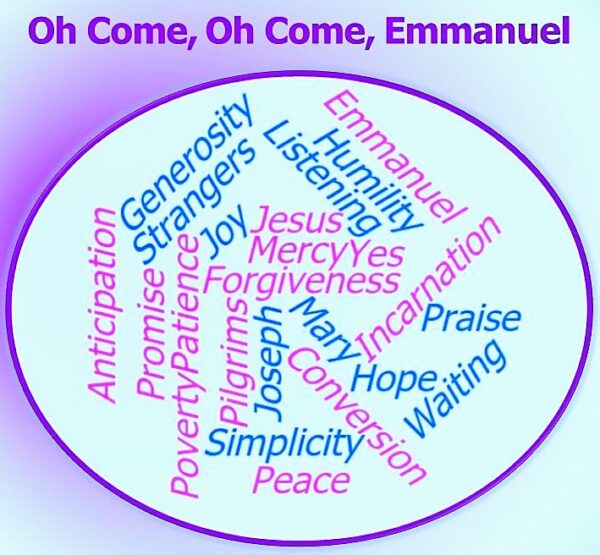
Please share with your fraternity
(en español abajo)
Advent is a time of waiting and meditation. We think about the coming of our Lord and Savior in the Incarnation and the part that Mary and Joseph played in his life. During this month we can use the words in the graphic (or the word bank below) in our prayer and meditation to focus on the meaning of this season. St. Francis was devoted to the Incarnation. This devotion came out in his prayer, his writings and in his actions.
Here are some ideas to put a Franciscan flavor in your Advent meditations:
- Choose a word or two from the word bank each day and see where those words or ideas come up in our Rule.
- Choose a word or two and see where they come up in Scripture—perhaps in the readings of the day or in the psalms as you pray the Liturgy of the Hours.
- Think of stories in Scripture and in the writings by and about Francis and Clare that typify hope and patience.
- Read online or in books that you have at home:
1 Celano chapter 30 (The story of the first Nativity scene at Greccio) (FA:ED, vol. 1, 254)
The First Life of St. Francis by Thomas of Celano
A Salutation of the Blessed Virgin Mary (FA:ED, vol. 1, 163)
The Praises of God (FA:ED, vol. 1, 109)
St. Clare’s Fourth Letter to Agnes of Prague (CA:ED, 56)
The references above (FA:ED and CA:ED) refer to Francis of Assisi: Early Documents and Clare of Assisi: Early Documents. These and many more writings of and about Francis and Clare can be found on the Franciscan Intellectual Tradition website: Feast of All Saints of the Seraphuc Order
Word Bank
Poverty, Peace, Emmanuel, Promise, Yes, Joy, Hope, Anticipation, Waiting, Praise, Generosity, Humility, Simplicity, Mary, Jesus, Joseph, Forgiveness, Mercy, Listening, Patience, Pilgrims, Strangers, Conversion, Incarnation, Greccio, Manger
____________________________________________________________
Formación 28 de noviembre, 2025

(Comparta con su fraternidad.)
El Adviento es una temporada de espera y meditación. Pensamos en la venida de nuestro Señor y Salvador en la Encarnación y el papel que María y José desarrollaron en su vida. Durante este mes podemos usar las palabras del banco de palabras abajo en nuestra oración y meditación para enfocarnos en el significado de esta temporada. San Francisco se dedicó a la Encarnación. Esta devoción se manifestó en su oración, sus escritos y sus acciones.
Aquí hay algunas ideas para darle un toque franciscano a sus meditaciones de Adviento:
- Elija una palabra o dos del banco de palabras cada día y vea dónde esas palabras o ideas aparecen en nuestra Regla.
- Elija una palabra o dos y vea dónde aparecen en las Escrituras, tal vez en las lecturas del día o en los salmos mientras reza la Liturgia de las Horas.
- Piense en historias en las Escrituras y en los escritos de Francisco y Clara y sobre ellos que tipifican la esperanza y la paciencia.
- Lea en Internet o en libros que tenga en casa:
1 Celano capítulo 30 (La historia del primer pesebre de Greccio) (FA: ED, vol. 1, 254)
Un saludo de la Santísima Virgen María (FA: ED, vol. 1, 163)
Las alabanzas del Dios altísimo (FA: ED, vol. 1, 109)
Cuarta carta de Santa Clara a Agnes de Praga (CA: ED, 56)
Las referencias anteriores en inglés (FA: ED y CA: ED) se refieren a Francisco de Asís: Primeros documentos y Clara de Asís: Primeros documentos. Estos y muchos más escritos de Francisco y Clara se pueden encontrar en el sitio web de la Tradición Intelectual Franciscana: (en inglés) Feast of All Saints of the Seraphuc Order
Banco de palabras
Pobreza, Paz, Emanuel, Promesa, Sí, Alegría, Esperanza, Anticipación, Espera, Alabanza, Generosidad, Humildad, Sencillez, María, Jesús, José, Perdón, Misericordia, Escucha, Paciencia, Peregrinos, Extranjeros, Conversión, Encarnación, Greccio, Pesebre
***********************************
Formation Friday November 21, 2025
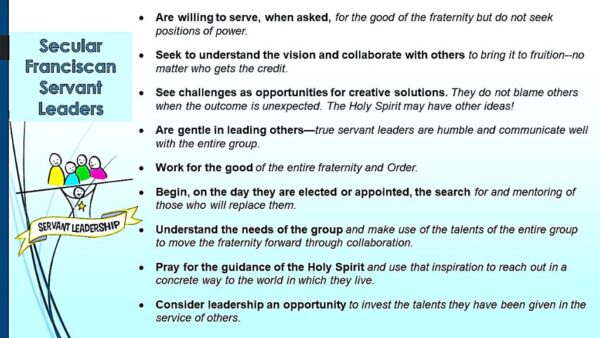
Please share with your local fraternity
(en español abajo)
This month we have been focusing on Servant Leadership. Today we offer the characteristics of good servant leaders (in no particular order). You may be able to add to the list based on the qualities you have observed in the excellent servant leaders you know.
Secular Franciscan Servant Leaders:
- Love the Order and are willing to serve, when asked, for the good of the fraternity but do not seek positions of power. Have enthusiasm for living the Rule.
- Seek to understand the vision and collaborate with others to bring it to fruition–no matter who gets the credit.
- See challenges as opportunities for creative solutions. They do not blame others when the outcome is unexpected. The Holy Spirit may have other ideas!
- Are gentle in leading others—true servant leaders are humble and communicate well with the entire group.
- Work for the good of the entire fraternity and Order.
- Begin, on the day they are elected or appointed, their search for and mentoring of those who will replace them.
- Understand the needs of the group and make use of the talents of the entire group to move the fraternity forward through collaboration.
- Pray for the guidance of the Holy Spirit and use that inspiration to reach out in a concrete way to the world in which they live and serve.
- Consider leadership an opportunity to invest the talents they have been given in the service of others.
- Are generous with their time and willing to make time in their lives to serve.
- Have life experience both in the Order and in the world that can be offered to the fraternity.
- Are willing to listen to others—to ask for and act on input from their brothers and sisters.
Questions for discussion in fraternity, with a partner, or in your journal.
+Think of servant leaders you have known. Which of these characteristics do you see in them?
+Which of these characteristics do you see in yourself?
+Which characteristics do you think you could develop in order to become a servant leader?
+If you presently hold office, which of the above characteristics can you improve in yourself?
+Challenge: This week, read Mt 25:14-30 and consider the talents and abilities God has given you. How will you invest them to serve your fraternity and the Order?
____________________________________________________________
21 de noviembre 2025

Este mes nos hemos centrado en el Liderazgo de Servicio. Hoy ofrecemos las características de los buenos líderes servidores (sin ningún orden en particular). Es posible que usted pueda ampliar la lista basándose en las cualidades que haya observado en los excelentes líderes servidores que conoce.
Líderes Servidores Franciscanos Seglares:
- Aman la Orden y están dispuestos a servir, cuando se les solicite, por el bien de la fraternidad, pero no busquen posiciones de poder. Tienen entusiasmo por vivir la Regla.
- Tratan de comprender la visión y colaborar con otros para hacerla realidad, sin importar quién se lleve el crédito.
- Ven los desafíos como oportunidades para soluciones creativas. No culpan a los demás cuando el resultado es inesperado. ¡El Espíritu Santo puede tener otras ideas!
- Son gentiles al liderar a otros; los verdaderos líderes servidores son humildes y se comunican bien con todo el grupo.
- Trabajan por el bien de toda la fraternidad y la Orden.
- Inician, el día de su elección o nombramiento, la búsqueda y tutoría de quienes los sustituirán.
- Comprenden las necesidades del grupo y hacen uso de los talentos de todo el grupo para hacer avanzar la fraternidad a través de la colaboración.
- Oran por la guía del Espíritu Santo y usan esa inspiración para llegar de manera concreta al mundo en el que viven y sirven.
- Consideran el liderazgo como una oportunidad para invertir los talentos que se les han otorgado al servicio de los demás.
- Son generosos con su tiempo y están dispuestos a dedicarlo en sus vidas para servir.
- Tienen experiencia de vida tanto en la Orden como en el mundo que pueda ofrecerse a la fraternidad.
- Están dispuestos a escuchar a los demás, a pedir y actuar en función de las aportaciones de sus hermanos y hermanas.
Preguntas para discutir en fraternidad, con un compañero o en su diario.
+Piense en los líderes servidores que ha conocido. ¿Cuáles de estas características ve en ellos?
+¿Cuáles de estas características ve en usted mismo?
+¿Qué características cree que podría desarrollar para convertirse en un líder servidor?
+Si actualmente ocupa un cargo, ¿cuáles de las características anteriores puede mejorar en si mismo?+ Desafío : esta semana, lea Mt 25:14-30 y considere los talentos y habilidades que Dios le ha dado. ¿Cómo los invertirá para servir a su fraternidad y a la Orden?
***********************************
Formation Friday November 14, 2025
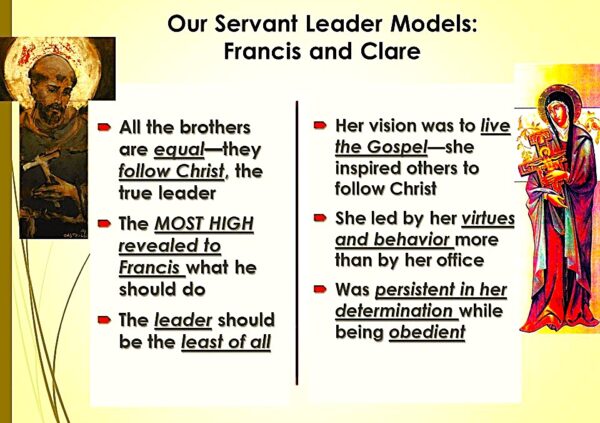
Please share with your local fraternity
(en español abajo)
The Handbook for Servant Leadership, published by OFS-USA in 2010, contains a wealth of information that can guide us in being or becoming excellent servant leaders. This week we are inspired by our models: Jesus, Francis and Clare. (See Handbook for Secular Franciscan Servant Leadership pp. 4-7)
Jesus as a leader: points to ponder:
- Jesus tells us that “no pupil outranks his teacher” (Matthew 10:24).
o If we want to be followers, we must deny ourselves, take up our cross and follow (Luke 9 23).
o Through his strong appeal and quiet persuasion, he enlisted others in his mission.
- He was patient and attempted to foster collaboration among the disciples, binding them together through love and the Spirit.
- He prepared them to carry out his work.
- He taught them the meaning of servant leadership. After washing their feet, he said, “What I just did was to give you an example: as I have done, so you must do” (John 13:15).
- He makes it clear that true leadership is grounded in love, which results in service
- Jesus did not have the whole future planned. He gave Peter and the Apostles the keys to the kingdom, allowing the Church to unfold through the leadership of committed people.
St. Francis as a servant leader: Points to ponder
- “And after the Lord gave me some brothers, no one showed me what I had to do, but the Most High Himself revealed to me that I should live according to the pattern of the Holy Gospel.” (The Testament of St. Francis FA:ED Vol 1 124 )
o The brothers are all equal. Everyone follows Jesus.
o The leader is the servant of all—washes the feet of the others.
- “We must never desire to be above others, but, instead, we must be servants and subject to every human creature for God’s sake.” (Later Admonition and Exhortation To the Brothers and Sisters of Penance FA: ED Vol 1 48)
- “Let no one be called superior but let everyone in general be called a lesser brother. And let one wash the feet of the other.” (St. Francis of Assisi, The Earlier Rule, VI:3-4).
- “Let the one to whom obedience has been entrusted and who is considered the greater be the lesser and the servant of the other brothers.”(St. Francis of Assisi, Later Admonition and Exhortation, FA:ED Vol 1 42)
- “I did not come to be served, but to serve, says the Lord. Let those who are placed over others boast about that position as much as they would if they were assigned the duty of washing the feet of their brothers.” (Admonition #4 FA:ED Vol 1 130)
St. Clare as a servant leader: Points to ponder
- “Let whoever is elected reflect upon the kind of burden she has undertaken on herself and to Whom she must render an account of the flock committed to her. Let her also strive to preside over the others more by her virtues and holy behavior than by her office, so that, moved by her example, the sisters may obey her more out of love than out of fear.” CA:ED, 114 (Form of Life)
- Clare never hesitated to work right alongside the sisters taking some of the more distasteful tasks for herself.
Questions for discussion in a group or with a partner or to answer in your journal:
+After reading the quotes above, what stands out to you as the leadership style of Jesus, Francis, and Clare?
+As a present or future servant leader, why is it important that we “wash the feet” of others?
+Which of the quotes above presents the greatest challenge to you?
+Challenge: This week take each of the quotes above to prayer. Ask the Holy Spirit to strengthen your skills as a present or future servant leader. Think about the service you can provide to your fraternity and to the Order.
____________________________________________________________
Formación 14 de noviembre 2025

Por favor comparta con su fraternidad local.
El Manual para el liderazgo de servicio, publicado por OFS-USA en 2010, contiene una gran cantidad de información que puede guiarnos para ser o convertirnos en excelentes líderes servidores. Esta semana nos inspiramos en nuestros modelos: Jesús, Francisco y Clara. (Ver Manual para el Liderazgo de Servicio Franciscano Seglar, págs. 4-7 en inglés)
Jesús como líder: puntos para reflexionar
- Jesús nos dice que “ningún alumno supera en rango a su maestro” (Mateo 10:24).
- Si queremos ser seguidores, debemos negarnos a nosotros mismos, tomar nuestra cruz y seguir (Lucas 9, 23).
- Mediante su fuerte llamamiento y su silenciosa persuasión, consiguió que otros se unieran a su misión.
- Fue paciente e intentó fomentar la colaboración entre los discípulos, uniéndolos mediante el amor y el Espíritu.
- Los preparó para realizar su obra.
- Les enseñó el significado del liderazgo de servicio. Después de lavarles los pies, dijo: “Lo que acabo de hacer es darles ejemplo: como yo he hecho, así también ustedes hagan” (Juan 13:15).
- Deja claro que el verdadero liderazgo se basa en el amor, que resulta en servicio.
- Jesús no tenía todo el futuro planeado. Le dio a Pedro y a los Apóstoles las llaves del reino, permitiendo que la Iglesia se desarrollara a través del liderazgo de personas comprometidas.
San Francisco como líder servidor: puntos para reflexionar
- “Y después que el Señor me dio algunos hermanos, nadie me mostró lo que tenía que hacer, sino que el Altísimo mismo me reveló que debía vivir según el modelo del Santo Evangelio”. (El Testamento de San Francisco)
- Los hermanos son todos iguales. Todos siguen a Jesús.
- El líder es el servidor de todos: lava los pies de los demás.
- “Nunca debemos desear estar por encima de los demás, sino que debemos ser servidores y sujetos a toda criatura humana por amor de Dios”. (Admonición y exhortación posterior a los hermanos y hermanas de la Penitencia)
- “Nadie sea llamado superior, sino que todos, en general, sean llamados hermano menor. Y que uno lave los pies del otro”. (San Francisco de Asís, La Regla anterior, VI:3-4).
- “Aquel a quien se ha confiado la obediencia y es considerado mayor, sea el menor y el servidor de los demás hermanos.” ( San Francisco de Asís, Admonición y exhortación posteriores)
- “No vine a ser servido, sino a servir, dice el Señor. Que los que están por encima de los demás se jacten de esa posición tanto como lo harían si se les asignara el deber de lavar los pies de sus hermanos”. (Admonición #4)
Santa Clara como líder servidora : puntos para reflexionar
- “Quien sea elegida reflexione sobre el tipo de carga que ha asumido sobre sí misma y a quién debe rendir cuentas del rebaño que le ha sido encomendado. Procure también presidir a las demás más con sus virtudes y santa conducta que con su oficio, para que, movidas por su ejemplo, las hermanas la obedezcan más por amor que por temor”. (Forma de vida)
- Clare nunca dudó en trabajar junto a las hermanas, encargándose ella misma de algunas de las tareas más desagradables.
Preguntas para discutir en grupo o con un compañero o para responder en su diario:
+Después de leer las citas anteriores, ¿qué destaca para usted como el estilo de liderazgo de Jesús, Francisco y Clara?
+Como líder servidor actual o futuro, ¿por qué es importante que “lavemos los pies” de los demás?
+¿Cuál de las citas anteriores presenta el mayor desafío para usted?
+Desafío: Esta semana lleve cada una de las citas anteriores a la oración. Pídale al Espíritu Santo que fortalezca sus habilidades como líder servidor actual o futuro. Piense en el servicio que puede prestar a su fraternidad y a la Orden.
***********************************
Formation Friday November 7, 2025

Please share with your local fraternity
(en español abajo)
The Handbook for Servant Leadership, published by OFS-USA in 2010, contains a wealth of information that can guide us in being or becoming excellent servant leaders. For the next few weeks we will focus on various portions of that handbook. We begin by preparing ourselves with an examination of our servant leader conscience.
A PRIVATE TALK WITH MYSELF
This private talk can be used to surface some of your inner feelings and give you an opportunity to reflect upon your own thoughts and actions. Take a few minutes to answer each question and just jot down a few words that will remind you of the thoughts and feelings that went through your head when you were responding to each question.
- How often does my approach to another brother or sister in the fraternity result in reactions different from those I intend? Does my brother or sister seem to be put off by my approach or does he or she seem to back away from me and the situation? Why do I think this is so?
- When I have a problem with a brother or sister in the fraternity, how often do I stop to think about my own actions and words? I may be contributing to the problem instead of to the solution. Do I need to change in this respect? How?
- Do I tend to use labels and stereotypes as a substitute for seeking to understand? Do I look at every fraternity brother and sister as an individual with unique talents and gifts, or do I become angry because my brothers and sisters do not respond the way I think they should?
- How do I try to solve fraternity problems? Do I always want to fix everything myself and prevent my brothers and sisters from becoming actively involved in the process of collaborative decision making?
- Do I have a need to be in control and when things do not go according to my plans, do I have a tendency to blame my brothers and sisters in the fraternity?
- Am I willing to talk with fraternity members about the impact their behavior has on other brothers and sisters in the fraternity? Can I share this information with constructive intent, in ways that minimize feelings of criticism and threat, and show concern for their feelings and needs? What do I need to work on here?
- How open am I to receiving information about how my approaches affect my brothers and sisters in the fraternity? How can I increase my opportunities for this kind of learning?
- What will I try to do differently next week and in the future in the way I relate to the brothers and sisters in my fraternity? What changes will increase my effectiveness with other fraternity members?
- How can I use my leadership skills to become a servant leader for my fraternity?
- What specific steps am I going to take to help my fraternity solve its problems?
For discussion in a group, with a partner, or to answer in your journal.
+ After thinking about each question above, which sets of questions did you find most challenging? Why?
+ Which sets of questions did you answer that show you are or can be effective as a servant leader? What are the characteristics that make you think this is true?
+ Which answers tell you that you have some work to do?
+ Challenge: Over the next several weeks, choose sets of questions that will help you to work on your servant leadership style and skills. Carry out any necessary changes.
Formación 7 de noviembre 2025
Por favor, comparta con su fraternidad local
El Manual para el Liderazgo de Servicio, publicado por OFS-USA en 2010, contiene una gran cantidad de información que puede guiarnos para ser o convertirnos en excelentes líderes de servicio. Durante las próximas semanas nos enfocaremos en varias partes de ese manual. Comenzamos preparándonos con un examen de nuestra conciencia de liderazgo de servicio.
UNA CHARLA PRIVADA CONMIGO MISMO
Esta charla privada se puede utilizar para sacar a la superficie algunos de sus sentimientos internos y darle la oportunidad de reflexionar sobre sus propios pensamientos y acciones. Tómese unos minutos para responder a cada pregunta y simplemente anote algunas palabras que le recordarán los pensamientos y sentimientos que pasaron por su mente cuando respondió a cada pregunta.
- ¿Con qué frecuencia mi acercamiento a otro hermano o hermana en la fraternidad resulta en reacciones distintas de las que pretendo? ¿Mi hermano o hermana parece estar desanimado por mi enfoque o él o ella parece alejarse de mí y de la situación? ¿Por qué creo que esto es así?
- Cuando tengo un problema con un hermano o hermana en la fraternidad, ¿con qué frecuencia me detengo a pensar en mis propias acciones y palabras? Puedo estar contribuyendo al problema en lugar de a la solución. ¿Necesito cambiar en este sentido? ¿Cómo?
- ¿Tiendo a usar etiquetas y estereotipos como sustituto de tratar de entender? ¿Veo a cada hermano y hermana de la fraternidad como un individuo con talentos y dones únicos, o me enojo porque mis hermanos y hermanas no responden de la manera que creo que deberían?
- ¿Cómo trato de resolver los problemas de la fraternidad? ¿Siempre quiero arreglar todo yo mismo y evitar que mis hermanos y hermanas se involucren activamente en el proceso de toma de decisiones colaborativa?
- ¿Tengo la necesidad de tener el control y cuando las cosas no salen de acuerdo con mis planes, tengo una tendencia a culpar a mis hermanos y hermanas en la fraternidad?
- ¿Estoy dispuesto a hablar con los miembros de la fraternidad sobre el impacto que su comportamiento tiene en otros hermanos y hermanas de la fraternidad? ¿Puedo compartir esta información con intención constructiva, de manera que minimice los sentimientos de crítica y amenaza, y muestre preocupación por sus sentimientos y necesidades? ¿En qué necesito trabajar aquí?
- ¿Qué tan abierto estoy a recibir información sobre cómo mis enfoques afectan a mis hermanos y hermanas en la fraternidad? ¿Cómo puedo aumentar mis oportunidades para este tipo de aprendizaje?
- ¿Qué trataré de hacer de manera diferente la próxima semana y en el futuro en la forma en que me relaciono con los hermanos y hermanas de mi fraternidad? ¿Qué cambios aumentarán mi efectividad con otros miembros de la fraternidad?
- ¿Cómo puedo usar mis habilidades de liderazgo para convertirme en un líder servidor para mi fraternidad?
- ¿Qué pasos específicos voy a tomar para ayudar a mi fraternidad a resolver sus problemas?
Para platicar en grupo, con un compañero o para responder en su diario.
+ Después de pensar en cada pregunta anterior, ¿qué conjuntos de preguntas le parecieron más desafiantes? ¿Por qué?
+ ¿Qué conjuntos de preguntas respondió que muestran que es o puede ser eficaz como líder servidor? ¿Cuáles son las características que le hacen pensar que esto es cierto?
+ ¿Qué respuestas le dicen que tiene trabajo que hacer?
+ Desafío: Durante las próximas semanas, elija conjuntos de preguntas que lo ayudarán a trabajar en su estilo y habilidades de liderazgo de servicio. Realice los cambios necesarios.
***********************************
Please e-mail Bob Longo, OFS, with any concerns, updates, or ideas for this website at: blongosfo@gmail.com
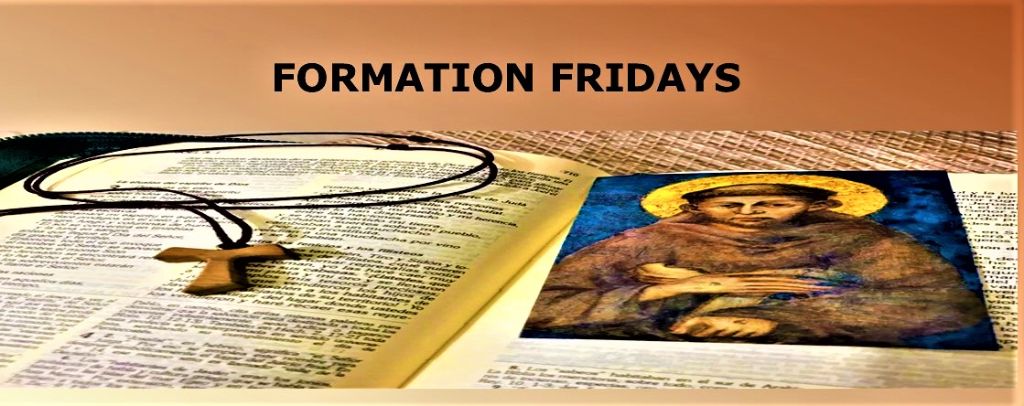
Social Media